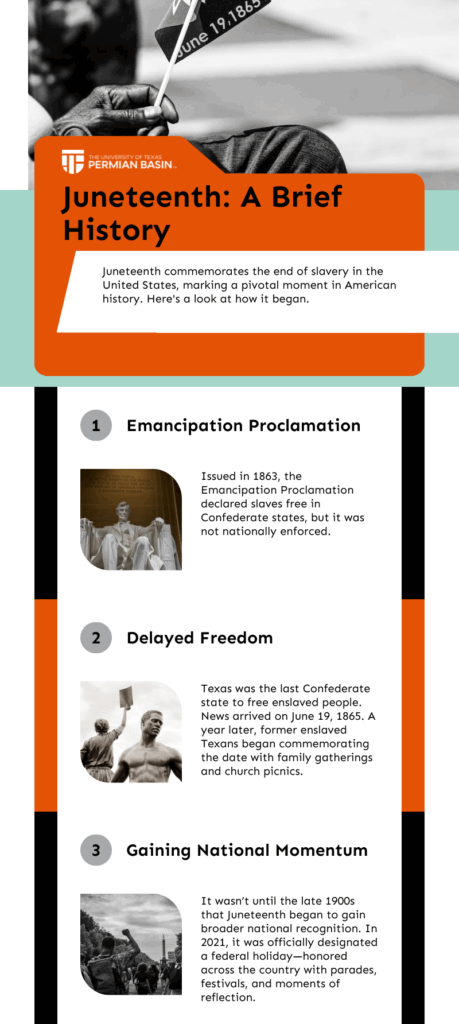Most Americans celebrate July 4th as the day the U.S. won its independence from Britain. But millions also recognize a second Independence Day, Juneteenth, which marks the day in 1865 when the last enslaved Americans in Texas finally learned they were free.
In this article, we explore the powerful history behind Juneteenth and how it has become a national symbol of delayed justice and the lasting freedom for all.
What Is Juneteenth and Why Is It Important?
On January 1, 1863, President Abraham Lincoln freed many American slaves when he issued the Emancipation Proclamation. However, it would be nearly three years before all slaves were freed nationwide.
The Civil War raged until April 1865, delaying the full impact of emancipation, as many slaveholding states resisted Lincoln’s directive. In addition, Lincoln’s proclamation didn’t apply to certain border states and regions under Union control, a gap later closed by the 13th Amendment—Abolition of Slavery—in December 1865.
Six months before that amendment was ratified, Union troops arrived in Galveston, Texas, and freed a quarter of a million slaves on June 19th, 1865. That day became a milestone as the broader promise of emancipation was finally realized. One year later on June 19th, 1866, former enslaved Texans began commemorating the date. The celebration became known as Juneteenth: a blend of “June” and “nineteenth.”
Also called Juneteenth Independence Day or Freedom Day, the holiday has a rich history. Initially marked by church picnics and speeches, Juneteenth gained momentum as Black Texans relocated to other states and took the tradition with them, spreading its observance nationwide and even internationally. Today, typical festivities include Emancipation Proclamation readings, parades, and concerts.
How Juneteenth Became a National Holiday
Juneteenth is an enduring reminder of the struggle for equality that Black Americans and their ancestors have faced, though awareness and acknowledgement of its significance were slow to come for the nation as a whole.
It’s perhaps fitting that in 1980, Texas became the first state to make Juneteenth an official holiday. Other states followed suit beginning in the 1990s, and by 2023 it was an official holiday or observance in all 50 states and the District of Columbia. Juneteenth became a federal holiday in 2021.
Study the Past to Impact Your Future: Earn Your MA in History
If you’re interested in the history of North America and its role in international events, The University of Texas Permian Basin’s online Master of Arts in History will help you master durable, highly marketable skills, and deliver a credential applicable to many careers. Our program offers an exploration of the Civil War, Reconstruction, and other key areas of our history through comprehensive 16-week courses. See the complete list here.
We offer this program in a 100% online, asynchronous format that empowers you to earn an MA in history on your own schedule from any location. You’ll find this flexibility invaluable while managing professional and personal responsibilities and finishing a master’s degree at the same time. And that’s just the beginning of our program’s benefits:
- Thesis and non-thesis options are available.
- Completion is possible in as little as two years.
See where graduates of this UTPB program are working now, potential future jobs, and corresponding salaries.
Ready to get started? Apply today.
Sources:
https://www.archives.gov/exhibits/featured-documents/emancipation-proclamation
https://jackmillercenter.org/emancipation-proclamation-juneteenth-holiday
https://constitutioncenter.org/the-constitution/amendments
https://www.pbs.org/newshour/politics/juneteenth-is-now-a-national-holiday-how-did-it-come-to-pass
https://sgp.fas.org/crs/misc/R44865.pdf
Other articles you may be interested in:
-
“Our country has deliberately undertaken a great social and economic experiment, noble in motive and far-reaching in purpose.” -Herbert Hoover Today, speakeasies are stylish bars hidden away behind bodegas, coffee shops, and laundromats. Ordering a cocktail is as easy as walking up to the bar, and while some places still require a password, you can…
-
Modern challenges like AI and global weather crises can stir up fear and controversy. But that’s for the scientists to sort out, right? Not exactly. The humanities play a powerful, often overlooked role in technology and science. Trends in these fields can create ethical, moral, environmental, and philosophical dilemmas. The humanities equip us to navigate…
-
At the iron gates of Auschwitz-Birkenau, one of the most infamous extermination camps of Nazi Germany, the chilling phrase “Arbeit macht frei” (“Work sets you free”) still casts a haunting shadow. These deceptive words led into one of history’s darkest chapters. Beyond that gate, more than a million lives were brutally ended. Auschwitz-Birkenau was just…



